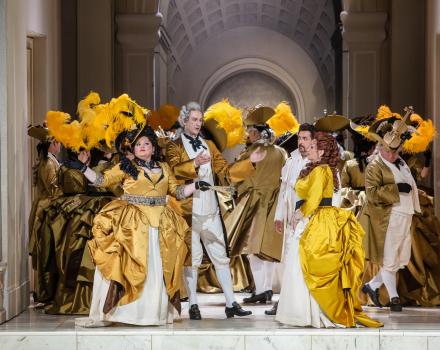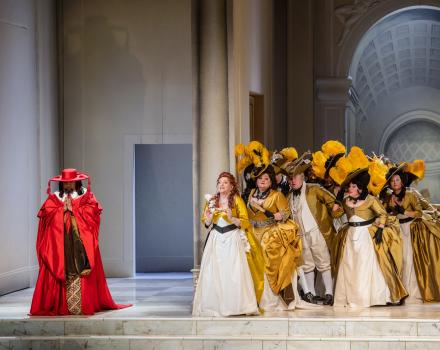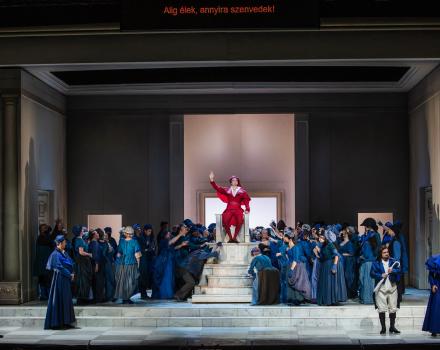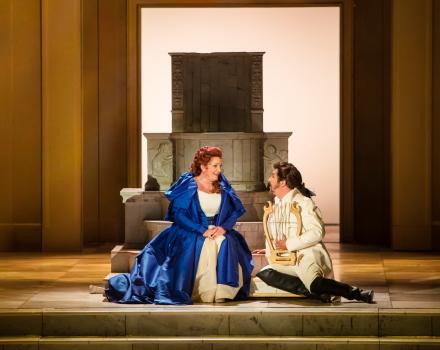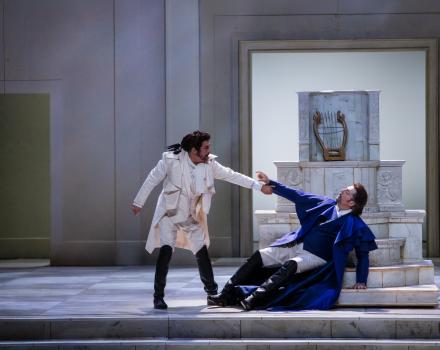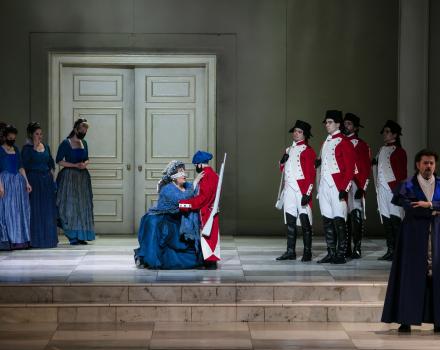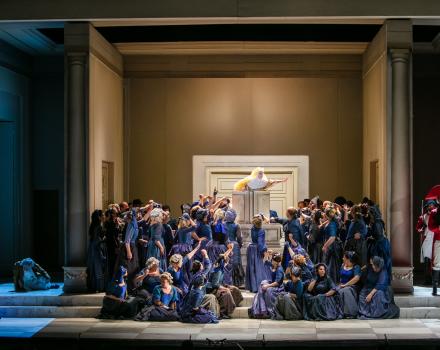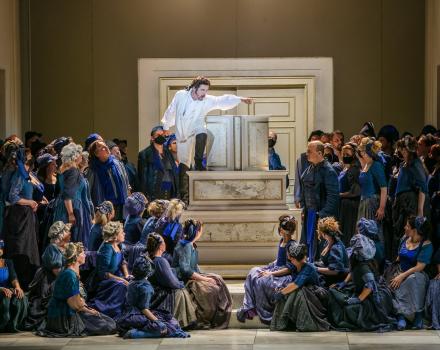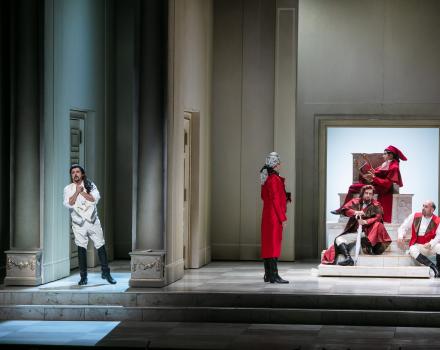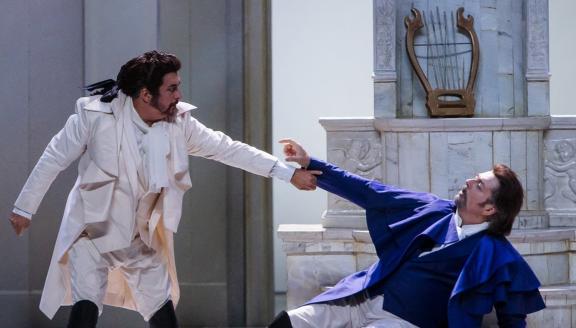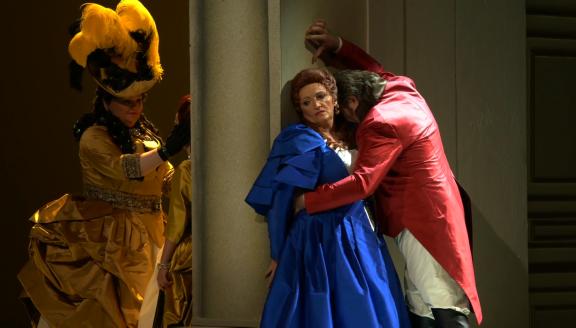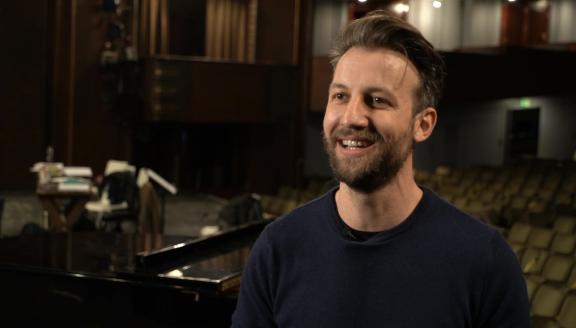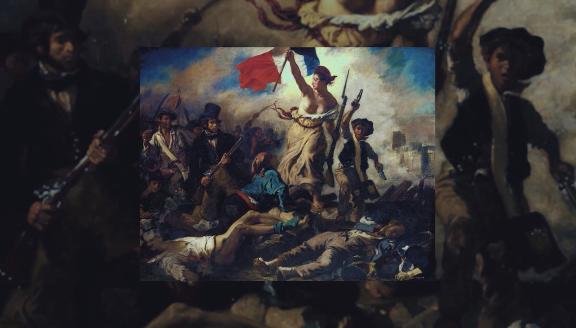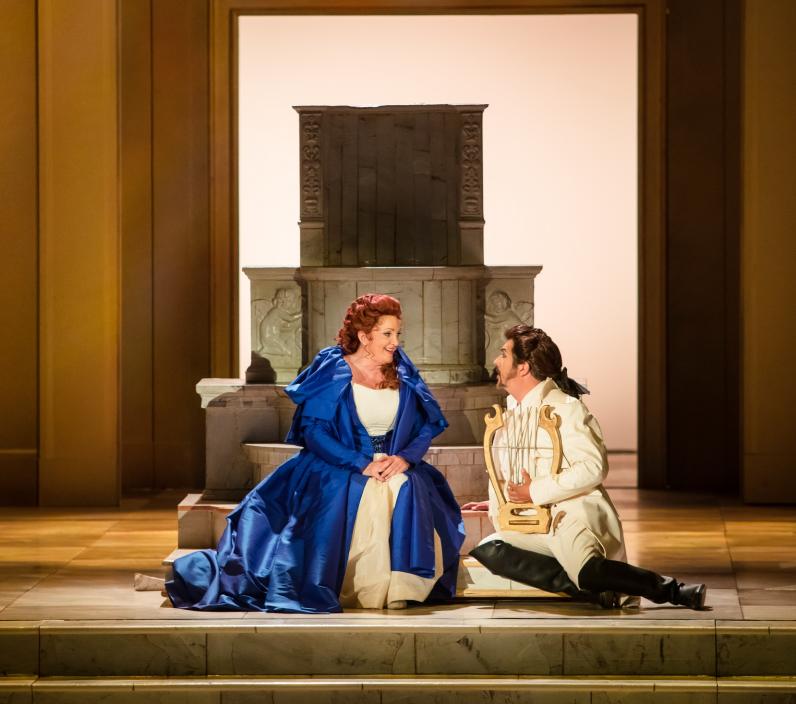

In the bloody shadow of the French Revolution's reign of terror, a poet and a revolutionary vie for the affections of a noblewoman. Can the guillotine be stopped as their friendship turns to rivalry?
In Andrea Chénier, the poet’s fate transcends actual events, telling the story of a tragic love triangle in which the lives of the protagonists are subject to the forces of history, betrayal and amorous passion. Along the way, Umberto Giordano's music, full of elegant aristocratic dances and popular revolutionary songs, perfectly captures the atmosphere of Paris before and during the French Revolution. Winner of the 2016 International Opera Award for Young Director, Fabio Ceresa returns to the Erkel Theatre for this impressive period production.
Cast
|
Andrea Chénier, a poet
|
Boldizsár László
|
|---|---|
|
Maddalena di Coigny
|
Eszter Sümegi
|
|
Carlo Gérard
|
Michele Kalmandy
|
|
The Countess of Coigny / Old Madelon
|
Bernadett Wiedemann
|
|
Bersi, her maid
|
Ildikó Megyimórecz
|
|
Pierre Fléville / Roucher / Fouquier-Tinville
|
Lajos Geiger
|
|
Mathieu, a sans-culotte
|
Máté Fülep
|
|
The Abbé / The Incredible, a spy
|
János Szerekován
|
|
Master of the Household / Dumas / Schmidt
|
András Hábetler
|
|
Chorus
|
Hungarian State Opera Chorus
|
|
Orchestra
|
Hungarian State Opera Orchestra
|
| ... | |
|
Music
|
Umberto Giordano
|
|---|---|
|
Conductor
|
Balázs Kocsár
|
|
Director
|
Fabio Ceresa
|
|
Sets
|
Tiziano Santi
|
|
Costumes
|
Giuseppe Palella
|
|
Text
|
Luigi Illica
|
|
Chorus master
|
Gábor Csiki
|
|
Assistants to the director
|
Judit Niklai, Katalin Kovács
|
|
Musical assistants
|
Katalin Doman, Anikó Katona, Kálmán Szennai
|
|
Hungarian translation (subtitles)
|
Márton Karczag
|
|
English translation (subtitles)
|
Arthur Crane
|
| ... | |
Video
The story
Act 1
France, 1789. In the home of the countess of Coigny, Carlo Gérard and the other servants are preparing for the evening festivities. When left by himself, Gérard airs his antipathy towards the aristocracy and predicts the impending doom of the ruling class. The countess, accompanied by her daughter, Maddalena, enters the ballroom to check that everything is ready to receive the guests. Gérard ponders the girl's beauty. The guests arrive. They include Fléville, a novelist, who enters the room together with his friend, the poet Andrea Chénier. One of the invitees, a priest, brings disturbing news straight from Paris. A short dramatic work follows: a performance of a pastoral play by Fléville. The countess also asks Chénier to recite a poem, but he refuses. Maddalena begins to taunt the poet, provoking him until he finally relents. He delivers a verse that starts with a romantic theme and then quickly becomes political, ending as a parable against tyranny. The aristocrats are scandalized, but the poet's words have had a great impact on Maddalena. In order to relieve the tension, the guests move on to the dancing, which is interrupted by a crowd of famished people. Gérard has let them into the house, but then chases them back out at the command of the shocked countess, whose service he leaves as he departs together with the unwanted visitors. The guests attempt to lift their spirits with another dance.
Act 2
Paris, 1794. The city is under Robespierre's reign of terror. Maddalena and her servant, Bersi, have come to the capital, where Bersi has become a courtesan in order to support both of them. The girl chats with an informer as they both watch Chénier, who is sitting nearby, and his friend Roucher. Roucher advises Chénier to flee Paris, but the poet's heart compels him to stay: for some time he has been regularly receiving letters from a mysterious, unknown girl. Roucher convinces him that the mysterious girl is most certainly a woman of loose morals, and so the disappointed Chénier decides to abscond with a fake passport. Gérard, now one of the leaders of the Revolution, instructs the informer to find Maddalena for him, which the spy promises to do. Bersi approaches Chénier and delivers a message from her mistress: she asks the poet to wait for her. Roucher and the spy observe from a distance. Maddalena appears dressed as a maidservant, and when she quotes to Chénier from the poem she had heard him deliver at Madame de Coigny's ball five years earlier, the poet recognises the girl. Maddalena, who has been living in great danger, finds refuge in Chénier's arms, and the two profess their love for each other. The informer tells Gérard that he has found the lady, and he and Gérard arrest the couple before they can commence their escape. The poet asks his friend to look after Maddalena; he himself starts to fight a duel with the revolutionary leader. Gérard is wounded and, recognising the poet, encourages him to flee, as his name is included on the list maintained by Fouquier-Tinville, the public prosecutor of the revolutionary tribunal. Andrea Chénier escapes, but Gérard tells the crowd gathering around him that he has been wounded by an unknown assailant. The mob blames the deed on the Girondistes.
Act 3
In the waiting room of the Revolutionary Tribunal, the somewhat inebriated Mathieu Populus is speaking to the people. The homeland is in danger: France is under attack by all of Europe. Gérard, who has recovered from his wounds, appears and continues Mathieu's speech. The people are moved by it and toss their last valuables into the collection box. An old and blind woman named Madelon even offers up her grandson, the last living male member of her family, for the defence of the country. The lad is taken up into the register and the crowd is soon out on the street singing La Carmagnole, the revolutionary anthem. The indefatigable informer brings more news: Chénier has been captured. Although Maddalena has disappeared, the spy reassures Gérard that if the case against the poet is strong enough, he can be condemned to death, and in that case there will be no need to look for Maddalena, since she will come on her own to beg for her beloved's life. Gérard writes out the charges against Chénier and, although he does not intend to behave dishonourably, his passion for Maddalena finally gets the better of him. Just as the spy predicted, Maddalena arrives. Gérard's crazed confession of love pushes the girl, who has already suffered a great deal, into a state of despair. Everyone around her has died, her mother has been killed, Bersi has taken up a life of sin for her sake and Chénier is languishing in prison. In exchange for her beloved's life, she is willing to give herself to Gérard. Gérard undergoes a change of heart and promises Maddalena that he will save Chénier even at the cost of his own life. The people stream into the chamber, curious to watch the hearings and executions. The jury and the president appear, along with Fouquier-Tinville, the public prosecutor. Finally, the accused are led in. Chénier is accused of treason, as well as of writing seditious poems against the revolution. The poet proclaims his innocence, but to no avail: the tribunal does not believe him. Gérard appears to testify in his favour, admitting that he was the one who wrote the charges and that he is now publicly withdrawing the allegations. Fouquier-Tinville remains implacable, and there are murmurs of bribery among the people. The jury's verdict: death.
Act 4
At the Saint Lazare prison. Andrea Chénier completes his final poem and shows it to his friend, Roucher. It is getting late, and the guard sends his friend away. Gérard escorts Maddalena to the prison. With gold and money, she pays off the guard so that when the executions are being carried out and the name of Idio Legray is called, she can take the condemned prisoner's place and thus die together with her beloved. The lovers meet in the cell and prepare for death together. It is growing light, and the hour of judgement is at hand.
Insights
Intense music, endless tension – Interview with conductor Balázs Kocsár
Where does Andrea Chénier take its place in operatic history?
Umberto Giordano’s piece was written at a time that saw the premiere of many exciting operas. Starting from the mid-19th century, a special medium had developed in all genres of art: artists applied brave new approaches without any barriers to their imagination. This is also typical of the period’s composers: accordingly, Andrea Chénier was born in a brave era of soul searching.
This piece is performed relatively seldom. Why is that?
The piece is not performed as often as Verdi or Puccini operas and the other emblematic works of verismo: next to Carmen, Cavalleria rusticana, or Pagliacci, Andrea Chénier is often left behind. However, there are still catchy songs and powerful chorus scenes in this piece too. Perhaps the only thing missing is interludes. Nevertheless, this extremely tightly packed piece with more than two full hours of music is able to perfectly express what it wants, and we are not left wanting: there is a single large, dramatic arc that the author maintains throughout.
The story unfolds through the three main characters of Chénier, Gérard, and Maddalena. The singers who play them really have to work hard to have the opera sound as it should. To bring out the musical and theatrical aspects of the exaggerated emotional moments of the verismo, composers were seeking out and testing the boundaries of the capabilities of performance, and they were not thinking in terms of the traditional roles. It is hard to find such universal singers, which is probably one of the reasons it is seldom included in opera repertoires.
How would you classify Giordano’s music?
Andrea Chénier is set in a very exciting historical period, and it provides the composer the possibility of showcasing the characters using a wide variety of music, including tableaus, the elaboration of dramatic moments, ariosi, duets, and scenes. The music is exciting and unbelievably intense, featuring recurring motifs. The composer even writes the arias using different forms than normal: they are much rather dramatic monologues. Giordano is also daring in handling the orchestra: he luxuriates in colour, he scintillates, and he uses frenetic dynamism, releasing enormous gobs of energy.
History and love are entwined in this opera. How does Giordano mix these two topics?
The direction of Fabio Ceresa paints the picture of the French Revolution in a very exciting manner. The director uses the traditional directorial approach to tell the story of these historical events – and the effect is even stronger than the work of the composer, making the production simultaneously traditional and modern. Giordano illustrates the romantic thread with the excessive expressions typical of the period. However, while a bel canto or romantic opera contains beautiful melodies that last for long minutes, in this case these are quite condensed: a couple of beats, motifs that immediately affect everyone, or just a simple interval or a single word that is used to express everything. All this has to be performed with enormous emotional content, but in a way that doesn’t end up having a negative effect on singing technique.
You have conducted plenty of operas. Where does Andrea Chénier stand in your career as a conductor?
The end of the 19th century and the beginning of the 20th century was a special time, and I have conducted a lot of operas written during this period. Directing the opera in Foggia, Giordano’s birthplace, in 2008 on occasion of the sixtieth anniversary of the composer’s death was a truly special experience.
Interview by: Diána Eszter Mátrai
Gallery
